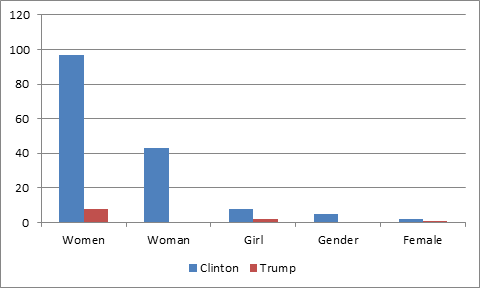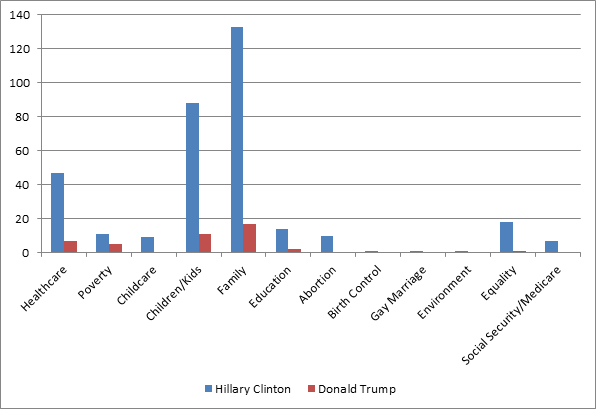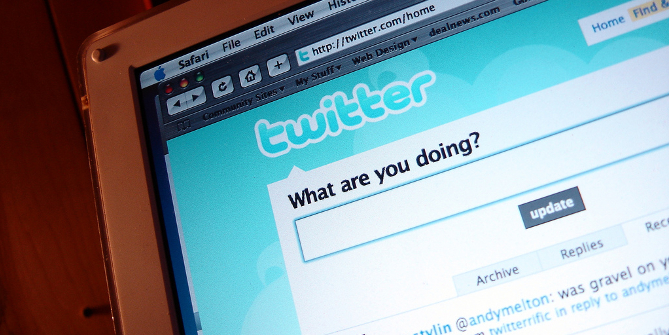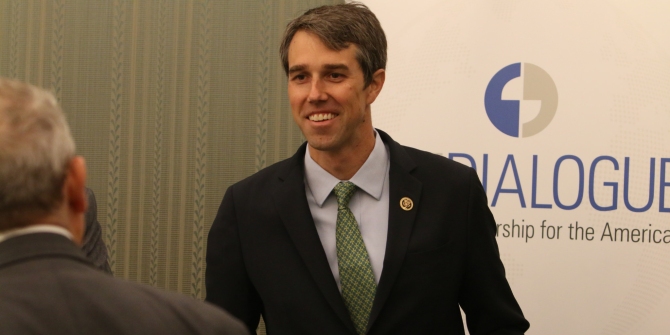

 Throughout the presidential election campaign Heather Evans, Kayla Brown, and Tiffany Wimberly have collected and coded tweets from both Hillary Clinton and Donald Trump. In their latest analysis, and in light of the release of the ‘Trump tapes’ this weekend, they find that Trump is largely ignoring ‘female issues’ while Clinton has talked about them significantly more often.
Throughout the presidential election campaign Heather Evans, Kayla Brown, and Tiffany Wimberly have collected and coded tweets from both Hillary Clinton and Donald Trump. In their latest analysis, and in light of the release of the ‘Trump tapes’ this weekend, they find that Trump is largely ignoring ‘female issues’ while Clinton has talked about them significantly more often.
With all of the news surrounding Donald Trump this weekend and his attitudes/ behavior towards women, we thought it would be good to go back and take a look at the ways he has tried to warm up to female voters on Twitter. Previously (here and here) we have written about how Hillary Clinton spent more time on policy issues on Twitter, especially so called “female issues,” during June and July of this year. Is she still discussing female-specific policy issues, and is he ignoring them?
The first way to see whether either candidate is focusing more on “women” is to simply search for the term in our database. Donald Trump has sent only eight tweets with the word “women” in them, compared to 97 sent by Hillary Clinton. If we examine the singular term “woman,” Hillary Clinton has mentioned the word 43 times, while Trump has never mentioned it. We also searched for the use of the terms “girl” “female” and “gender,” and cumulatively Trump has mentioned these words three times, compared to 15 for Hillary Clinton.
Figure 1 – Twitter mentions of key words by Hillary Clinton and Donald Trump

Next we turn to examining policy mentions. Just because a candidate mentions women doesn’t necessarily mean they address “female issues” on Twitter. We focus on the same issues we have coded for before that relate to women as a group (health, welfare, education, and the environment), feminist concerns seeking to improve the status of women as a group (equality/equal rights, Gay, Lesbian, Bisexual, Transgender, Questioning, and Allied (GLBTQA) rights, poverty), Plan B, abortion, pro-choice, and pro-life, as well as domestic violence and rape.
When we search our data for the number of times each candidate has at least paid lip service to the words associated with the these issues, we find that Hillary Clinton is talking significantly more about “female issues” than Donald Trump over the past four months. She has sent 340 tweets about these topics, compared to only 43 by Donald Trump. As a proportion of total tweets, Hillary Clinton has tweeted about these topics in 14 percent of her tweets, while Donald Trump has discussed these topics in only 4 percent of his tweets. There’s no “female issue” that Donald Trump discusses more than she does on Twitter. He hasn’t discussed childcare even once on Twitter, even though his daughter said he would focus on that topic during his campaign and he unveiled a plan for women in September.
Figure 2 – Policy mentions on Twitter by Hillary Clinton and Donald Trump

When we go farther and look at the context in which these words were used on the candidates’ Twitter feeds over the past four months, the results are even more depressing for the discussion of “female issues” on Donald Trump’s page. If we take the topic of family (using the key word searches of family and families), since that was the topic that was discussed the most on both Twitter pages, we find that Donald Trump does not even once discuss family as it relates to helping families make ends meet, paid family leave, education, or taxes. The closest we get to a policy tweet about helping families in any way at all is a tweet from Trump on June 23rd:
https://twitter.com/realdonaldtrump/status/746044729343741956
All of his other tweets related to family are “thoughts and prayers” tweets or talking about meeting with someone’s family.
When it comes to Hillary Clinton’s tweets about family, however, she regularly discusses plans she has to help families in the US. For instance, on September 29th, she tweeted:
Let’s make college tuition-free for any family whose income is $125,000 or less and debt-free for everyone. https://t.co/BnULejv7dG
— Hillary Clinton (@HillaryClinton) September 29, 2016
Like Donald Trump, she too expresses sympathy to families on Twitter, but most of her tweets including the word “family” or “families” are about ways to help citizens make ends meet.
Given the tapes that were released on Friday, we should expect women to part ways with Donald Trump (if they haven’t already). If paying lip service to “female issues” is any indicator of the dedication a candidate has to those issues, our analysis of their tweets shows that women shouldn’t have supported Donald Trump in the first place.
Featured image credit: Andy Melton (CC- BY-SA-2.0)
Please read our comments policy before commenting.
Note: This article gives the views of the author, and not the position of USAPP – American Politics and Policy, nor the London School of Economics.
Shortened URL for this post: http://bit.ly/2dORHnx
_________________________________
 Heather Evans – Sam Houston State University
Heather Evans – Sam Houston State University
Heather Evans is an Associate Professor in the Department of Political Science at Sam Houston State University. Her primary research interests are political participation and behavior, public opinion, competitive elections, media and politics, the status of women in the political science discipline, and political psychology.
 Kayla Brown
Kayla Brown
Kayla Brown is a junior majoring in political science at Sam Houston State University.
 Tiffany Wimberly
Tiffany Wimberly
Tiffany Wimberly is a junior majoring in political science at Sam Houston State University.




